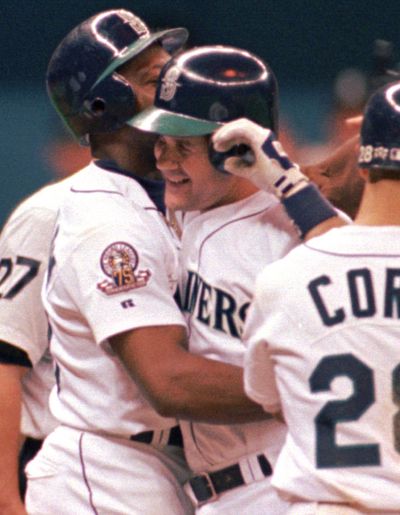Maybe it’s time for Mariners to forget about ’95

It just continues.
Two decades later, the 1995 season remains a beacon of Mariners history. Check that: The beacon, and therein lies the problem. The ballclub’s shining moment, over time, has become in some ways the leading symbol of its ongoing rut.
This is not to be a killjoy, mind you. The organization’s reverence for 1995, and the inclination for some fans to cling to it, is absolutely legitimate. Most franchises, in every sport, have an epic season that becomes permanently embedded in the local consciousness, the stuff of legend and lore.
For the Mets (but most definitely not the Cubs), it’s 1969. For the Red Sox, 2004. For the Seahawks, 2013. Merely uttering the year instantly invokes smiles, chills, warm feelings – often simultaneously,
For the Mariners, of course, it’s 1995, at least until that (so far) hypothetical day in which they get to a World Series, or, pray tell, win it.
That year had almost a cinematic arc, from the threats of a move to Tampa Bay, through an early-season injury to Ken Griffey Jr., the seemingly insurmountable deficit to the Angels, and then the thundering comeback, replete with miracle wins. Throw in a one-game playoff for the division title, a playoff series for the ages against the Yankees, all leading to approval of a funding package for a new stadium, and you’ve got something special.
It was a season that also had national ramifications. The players strike had launched in August 1994, causing cancellation of the World Series. It wasn’t settled until early April 1995 (after a dreary “replacement spring”), so antagonism toward baseball was strong as the ’95 season launched.
I’d make the argument, and would not be alone in so doing, that Cal Ripken Jr.’s breaking of Lou Gehrig’s consecutive-game streak in September 1995, the Mariners’ thrilling- beyond-belief playoff series with the Yankees in October of ’95, and the home run chase between Mark McGwire and Sammy Sosa in ’98 were the trio of events that revitalized baseball and propelled it out of its post-strike funk.
I’ve heard enough stories to know what the 1995 season meant to people. Youngsters coming of age as baseball fans. Seniors who reveled vicariously through the team’s exploits. Shut-ins and the infirm who used the daily drama to bring joy to their lives.
But I sense more and more that there is not only 1995 fatigue among Mariners fans, but 1995 backlash. In anniversary years, such as this one, that feeling is accentuated, because the 1995 references are even more prevalent.
This isn’t a complex psychological phenomenon. The sentiment I hear, often, is a sense of resentment that there hasn’t been much positive history from the team to fill the void. This will be the 14th consecutive Mariners season without a playoff appearance.
Barring a miracle comeback, that is. And that’s another thing – 1995 is continually dragged out as a ray of false hope for every Mariners team that finds itself hopelessly behind in August. Hey, the Mariners were 11½ games behind the Angels on this date in 1995, so there’s still a chance!
Except for the fact that those Mariners had only one team to overcome, and now they have eight. And that Seattle team had two first-ballot Hall of Famers in Randy Johnson and Griffey, and one should-be Hall of Famer in Edgar Martinez, all in their prime.
There’s a reason that only a few teams a generation overcome deficits like that Mariners team did; it takes an extraordinary confluence of events that are extraordinarily hard to replicate. Having hope is good, but using history as a crutch isn’t reasonable, especially at a time in the team’s history when it needs to take a good, hard, unflinching look at where it stands.
It’s not a pretty picture. This has been a season of underachievement and dashed hopes. Another in a long line. And that, more than anything, explains the reflexive recoiling at 1995 lovefests. A time of heightened angst is not necessarily the optimal environment for nostalgia. Sentiment wears thin after a while.
Paradoxically, I think that, when the Mariners finally put together a period of sustained success, then 1995 will go down more smoothly. And it will happen, eventually.
When the Mariners get good and the pennant races are invigorating, it will be a more receptive time to hearken back fondly to the most stirring season of them all.